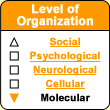|
The kind of long-term depression that
we are talking about here is not the depressed psychological
state that immediately comes to mind when you hear this expression.
Rather, we are talking about a molecular process by which the
brain’s neurons can reduce
the efficiency of the connections between them.
Long-term depression is, in a sense, the opposite of long-term
potentiation, the process by which synaptic connections are
strengthened in order to store new information in memory.
Because the neurons of the brain’s
two hippocampi, through which newly memorized facts enter,
cannot keep strengthening their synapses indefinitely.
Scientists believe that one possible
role of long-term depression might be to bring the strengthened
synapses back to their baseline level– resetting them to
zero, so to speak, and thus erasing old memories so that new
ones can be stored in their place.
If these memory traces have had enough time to be transferred
from the hippocampus to other circuits of the brain, they will
probably be retained for a long time. Otherwise, they will be forgotten,
as a result of the process of long-term depression.
Just like long-term potentiation, long-term depression is based
on movements
of calcium ions, but triggered in this case by a particular pattern
of stimulation.
|




